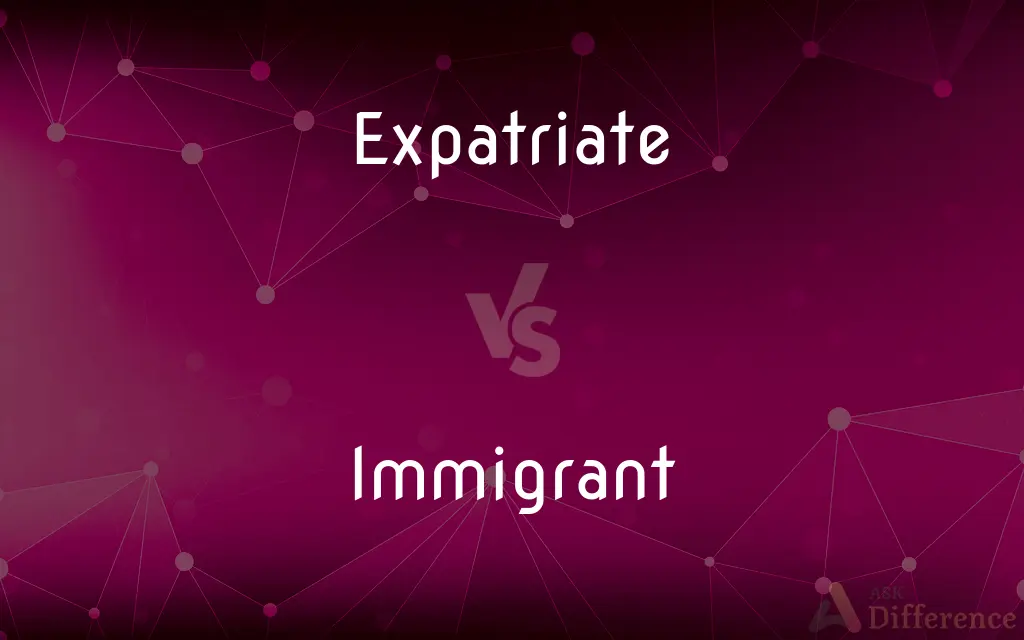Expatriate vs. Immigrant — What's the Difference?
By Urooj Arif & Fiza Rafique — Updated on April 20, 2024
An expatriate temporarily lives in a foreign country, typically for work or lifestyle reasons, whereas an immigrant moves permanently, seeking long-term residency or citizenship.

Difference Between Expatriate and Immigrant
Table of Contents
ADVERTISEMENT
Key Differences
An expatriate, often shortened to expat, is someone who resides temporarily in a foreign country, usually for employment, education, or retirement purposes. Whereas, an immigrant is an individual who moves to a new country with the intention of settling there permanently, often in pursuit of better economic opportunities, family reunification, or safety.
Expatriates often maintain strong ties to their home country and may plan to return after their assignment or period abroad ends. On the other hand, immigrants typically undertake the process of integrating into the new society, often seeking permanent residency or citizenship.
The term expatriate does not necessarily imply any change in citizenship or permanent change in residence; it focuses more on the temporary nature of the stay. In contrast, immigration strongly implies an effort to change one's permanent residence and possibly national allegiance.
Work circumstances for expatriates often involve international companies, diplomatic positions, or global organizations, and they may receive special benefits or compensations for living abroad. Immigrants, however, might migrate for a variety of reasons and might not have the same support structures, which often requires them to start from scratch in their new country.
While expatriates often reside in expat communities and might not fully integrate into the local culture, immigrants are more likely to assimilate, learn the local language, and adapt to local customs as they make their new country their home.
ADVERTISEMENT
Comparison Chart
Duration of Stay
Temporary, often defined
Permanent
Purpose
Employment, education, lifestyle
Economic, safety, family
Citizenship Intent
Maintains original citizenship
May seek new citizenship
Cultural Integration
Minimal; often stays in expat communities
High; seeks to integrate fully
Typical Benefits
Often receives expat packages
May lack support, starts anew
Compare with Definitions
Expatriate
May live in areas populated by other expatriates.
They found a vibrant expatriate community in the heart of the city.
Immigrant
A person who moves to another country for permanent residence.
As an immigrant in Canada, he embraced his new home with enthusiasm.
Expatriate
A person living outside their native country, usually for professional reasons.
As an expatriate, she enjoyed learning about new cultures while working abroad.
Immigrant
Seeks to establish a new life in the host country.
The immigrant family opened a restaurant to bring a taste of their homeland to the neighborhood.
Expatriate
Often retains their citizenship and plans to return home.
Despite living in Spain for five years, he remained an expatriate with no plans to give up his U.S. citizenship.
Immigrant
May apply for citizenship in the new country.
After living in Germany for eight years, she applied for citizenship.
Expatriate
Can be an employee of multinational corporations.
The company sent him to Dubai as an expatriate to manage the new branch.
Immigrant
Often integrates into local society, adopting new customs.
Immigrants often attend language classes to better assimilate.
Expatriate
Typically resides in a country temporarily.
She lived as an expatriate in Japan, teaching English for two years.
Immigrant
Comes from diverse backgrounds and for various reasons.
The city's population included immigrants from over fifty countries, each contributing to its diversity.
Expatriate
An expatriate (often shortened to expat) is a person residing in a country other than their native country. In common usage, the term often refers to professionals, skilled workers, or artists taking positions outside their home country, either independently or sent abroad by their employers.
Immigrant
A person who comes to live permanently in a foreign country
An immigrant village
Immigrant workers
They found it difficult to expel illegal immigrants
Expatriate
To send into exile
They were expatriated because of their political beliefs.
Immigrant
A person who leaves one country to settle permanently in another.
Expatriate
To remove (oneself) from residence in one's native land.
Immigrant
An organism that establishes itself in an area where it previously did not exist.
Expatriate
To give up residence in one's homeland.
Immigrant
Of or relating to immigrants or the act of immigrating.
Expatriate
To renounce allegiance to one's homeland.
Immigrant
A non-native person who comes to a country from another country to permanently settle there.
Expatriate
One who has taken up residence in a foreign country.
Immigrant
A plant or animal that establishes itself in an area where it previously did not exist.
Expatriate
One who has renounced one's native land.
Immigrant
Of or relating to immigrants or the act of immigrating.
Expatriate
Residing in a foreign country; expatriated
"She delighted in the bohemian freedom enjoyed by the expatriate artists, writers, and performers living in Rome" (Janet H. Murray).
Immigrant
One who immigrates; one who comes to a country for the purpose of permanent residence; - correlative of emigrant.
Expatriate
Living outside of one's own country.
An expatriate rebel force
Immigrant
A person who comes to a country where they were not born in order to settle there
Expatriate
One who lives outside one's own country.
Expatriate
One who has been banished from one's own country.
Expatriate
(transitive) To banish; to drive or force (a person) from his own country; to make an exile of.
Expatriate
(intransitive) To withdraw from one’s native country.
Expatriate
(intransitive) To renounce the rights and liabilities of citizenship where one is born and become a citizen of another country.
Expatriate
To banish; to drive or force (a person) from his own country; to make an exile of.
The expatriated landed interest of France.
Expatriate
Reflexively, as To expatriate one's self: To withdraw from one's native country; to renounce the rights and liabilities of citizenship where one is born, and become a citizen of another country.
Expatriate
Voluntarily absent from home or country
Expatriate
Expel from a country;
The poet was exiled because he signed a letter protesting the government's actions
Expatriate
Move away from one's native country and adopt a new residence abroad
Common Curiosities
Can an expatriate become an immigrant?
Yes, if an expatriate decides to remain in the host country permanently and seeks citizenship, they transition into an immigrant.
Do expatriates always work for foreign companies?
Not necessarily; expatriates may work for their own country's government, international NGOs, or even study.
What differentiates an expatriate from an immigrant?
An expatriate lives abroad temporarily and often for specific reasons like work, while an immigrant moves permanently to pursue a new life.
How does the legal status differ between an expatriate and an immigrant?
Expatriates generally maintain their original legal status and citizenship, while immigrants change their legal status to that of a permanent resident or citizen of the host country.
Are expatriates always from Western countries?
No, expatriates can come from any country and live in any other country; the term is not limited to Western nationals.
What motivates someone to become an immigrant rather than an expatriate?
Motivations can include seeking better economic opportunities, escaping unfavorable conditions at home, or reuniting with family.
How do host countries benefit from expatriates and immigrants?
Expatriates can bring specialized skills and international perspectives, while immigrants contribute to cultural diversity and economic growth.
How can one transition from being an expatriate to an immigrant?
This transition involves deciding to stay in the host country permanently, possibly seeking permanent residency or citizenship.
What are common challenges faced by immigrants?
Immigrants often face challenges such as cultural adaptation, securing employment, and legal barriers to residency or citizenship.
Why might someone choose expatriate life over immigration?
Preferences for temporary relocation, retention of home country benefits, or career-related assignments can influence the choice.
What role do language and culture play in the experiences of expatriates and immigrants?
Both groups must navigate language barriers and cultural differences, but immigrants typically make a more concerted effort to integrate fully.
What support systems exist for expatriates?
Expatriates often have access to networks and resources from their employers, including relocation assistance and cultural integration training.
How do societal perceptions differ between expatriates and immigrants?
Expatriates are often viewed as temporary and professional residents, whereas immigrants may be seen as permanent additions to the community with diverse socio-economic impacts.
Is the expatriate lifestyle considered more privileged than that of an immigrant?
Often yes, as expatriates may receive substantial benefits and support not available to immigrants.
What legal documents are required for expatriates and immigrants?
Expatriates typically need work visas or temporary residency permits, while immigrants require permanent residency status or citizenship documentation.
Share Your Discovery

Previous Comparison
Hinduism vs. Islam
Next Comparison
Dollar vs. RupeeAuthor Spotlight
Written by
Urooj ArifUrooj is a skilled content writer at Ask Difference, known for her exceptional ability to simplify complex topics into engaging and informative content. With a passion for research and a flair for clear, concise writing, she consistently delivers articles that resonate with our diverse audience.
Co-written by
Fiza RafiqueFiza Rafique is a skilled content writer at AskDifference.com, where she meticulously refines and enhances written pieces. Drawing from her vast editorial expertise, Fiza ensures clarity, accuracy, and precision in every article. Passionate about language, she continually seeks to elevate the quality of content for readers worldwide.













































